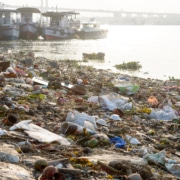28 January 2021
Banks invest $790 million daily in 40 major companies involved in producing and using plastic packaging. Between January 2015 and September 2019, funding exceeded $1.7 trillion. The most considerable contribution to the plastic soup comes from the single-use plastic used to package food. Despite this, banks continue to provide capital without regard to the consequences.
The report The Bankrolling Plastics: The banks that fund plastic packaging pollution was released this month. This report mentions that banks are silent about their role in actually financing the plastic soup, while at the same time, plastic pollution is recognized as one of the greatest environmental disasters. The banks lack a diligence system of due care criteria, as is used in other areas.
The report was prepared by Portfolio.earth, a non-profit organization that points out the finance industry’s role in contribution tot he destruction of nature.
TWENTY BANKS FINANCE ALMOST ALL PLASTIC PRODUCTION
Of the $1.7 trillion in plastic loans and bond issues, $1.4 trillion comes from twenty major banks (80%). The ten largest banks account for 62%. There is no indication that these banks are scaling back their investments, despite the damage plastic does to the environment. Three American banks – Bank of America, Citigroup, JPMorgan Chase – head the list.
BANKS MUST ALSO TAKE RESPONSIBILITY
Like the authors of this report, the Plastic Soup Foundation believes that banks must say shift away from business models that rely on single-use packaging plastic and subsequently focus on reuse, recycling, and local sourcing. Portfolio.earth notes that a significant discrepancy has emerged between government policies to discourage the use of plastic and banks’ funding policies. Thus, banks risk losing the legitimacy of their actions.
To bring about a necessary systemic change, Portfolio.earth advocates that banks:
- no longer finance companies that use new (virgin) plastic for single-use packaging of consumer products;
- establish due diligence requirements for lending that focus on reducing single-use plastic and encouraging reuse;
- provide insight into the relationship between the lent capital and plastic pollution.
ING IS IN THE TOP 20
The only Dutch bank in the top 20, in position 17, is the ING Group. This bank accounts for 1.87% of plastic financing. For no. 1, Bank of America, the figure is 10.3%.
The Bankrolling Plastics report notes that none of the top 20 banks have formulated an investment policy that focuses on reducing the plastic soup. While ING has signed up to the Ellen MacArthur Foundation’s New Plastic Economy Global Commitment to reduce plastic waste and promote recycling, it does not assess capital contributions against criteria to reduce plastic pollution.
ING: WORDS NOT DEEDS
The absence of such criteria leads to strange situations. For example, in 2019, the bank published the Dutch report on plastic packaging in the food sector, and in it, the bank shows concern about the plastic soup. While the report provides directions for solutions, such as better recycling of packaging, it fails to mention that ING itself has a major responsibility as a financier, let alone that due diligence is lacking when providing capital.
The Plastic Finance (2019) study by the Eerlijke bankwijzer in partnership with Plastic Soup Foundation shows that ING has invested at least $3.9 billion in shale gas and plastic production since 2010. It is contradictory when ING says it is concerned about the plastic soup, while in the meantime, the bank finances shale gas producers. After all, shale gas is precisely the cause of a massive influx of cheap single-use packaging plastic.
In the Netherlands, only ASN has a policy that explicitly takes the plastic soup into account.
YOU MIGHT ALSO BE INTERESTED IN:





